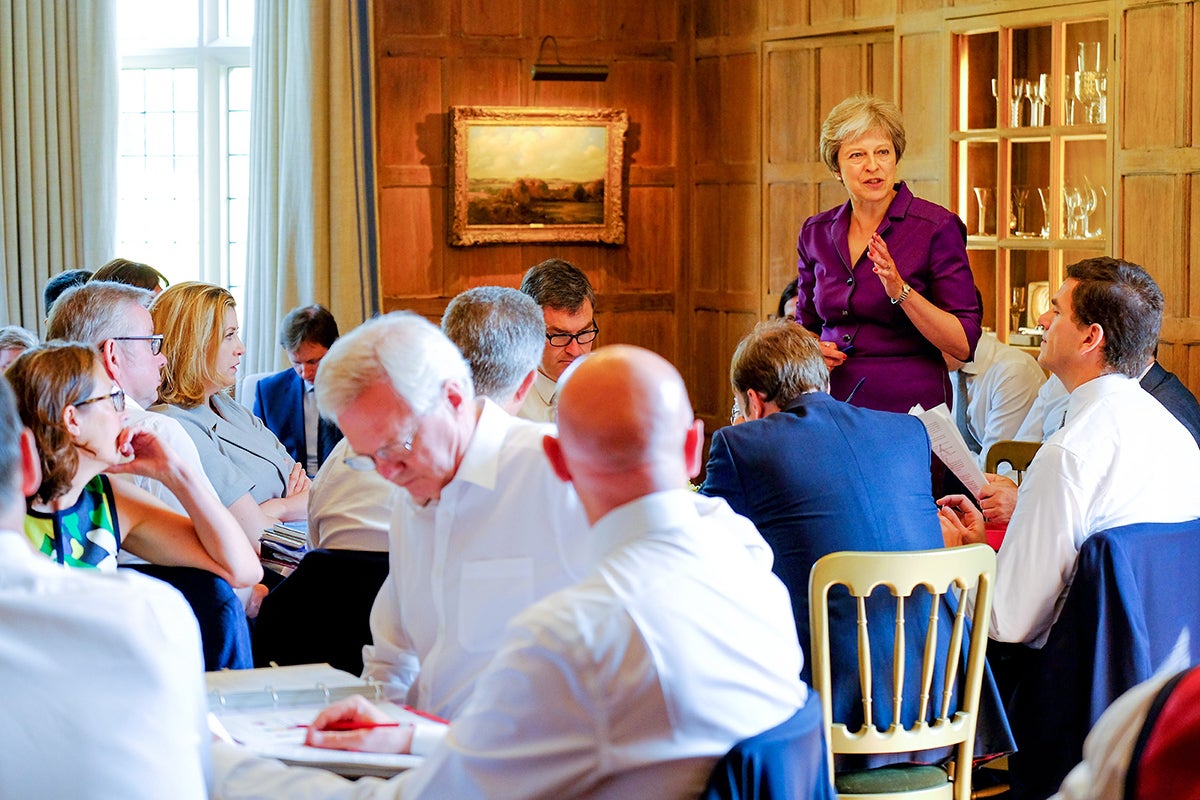Theresa May has pulled off a deal with her cabinet – and no one has resigned
The prime minister has forced her ministers to fall into line – now for the hard part: reaching agreement with the European Union side


Theresa May wore them down in the end. Her senior ministers rejected her plan for customs after Brexit. Boris Johnson called it “crazy” in public. Sajid Javid, who is now the bookies’ favourite to succeed her, opposed it when he joined the Brexit committee. So she went round them and summoned the whole cabinet to Chequers. Now they have all signed up for it and no one has resigned.
Her plan is called something different now, the Facilitated Customs Arrangement instead of the New Customs Partnership, but it is the same idea – that the UK will collect EU tariffs on its behalf. We will be free to set our tariffs differently in theory but in practice we probably won’t because it would be a bureaucratic nightmare.
The critical phrase in the statement issued after the all-day Chequers cabinet meeting is that the UK and the EU would be “as if a combined customs territory”. It would be a customs union but it won’t be called one. The cabinet has signed up to the policy of the official opposition, as drawn up by Keir Starmer, the shadow Brexit secretary, where “shadow” means “real”.
A similar principle underlies the rest of plan for the future UK-EU relationship agreed by the cabinet today. For food and manufactured goods the UK will be in the EU single market, but we won’t call it that.
The key paragraph of tonight’s statement is 6(f): “The position we reached today would … ensure that in the future all laws in the UK would be legislated for by parliament … recognising that where the UK had chosen to apply a common rulebook parliament would still have a lock on incorporating rules into the UK legal order, but choosing not to pass the relevant legislation would lead to consequences for market access, security cooperation or the frictionless border.”
In other words, the UK parliament could choose not to mirror EU laws, but that would lead to “consequences”, namely the economic damage of being shut out. So we will continue to copy EU laws for much longer than any politicians’ five-year horizon. We will be rule takers, but only because we want to be.
Alarmingly, after all the fuss over the Chequers meeting, that was the easy part of Theresa May’s task over the next few months. Now she has to sell this plan to the EU side in the negotiations.
Her plan is not so much cherry picking the single market, it is an attempt to hijack about a fifth of the entire cherry stockpile. The EU is unlikely to accept it, but that’s what people say at the start of negotiations and the question is what concessions each side will make. Hence the pre-emptive strike from Michel Barnier, the EU negotiator, this morning.
The EU position is that enjoying the benefits of the single market means accepting its responsibilities, namely the free movement of people. Which is why 6(h) and 6(i) of the Chequers Declaration are so important. The government promises to “end free movement” in 6(h), but in 6(i) offers “a mobility framework so that UK and EU citizens can continue to travel to each other’s territories, and apply for study and work – similar to what the UK may offer other close trading partners in the future”.
The meaning of those words will be crucial to the next stage of the Brexit talks. Interestingly, the prime minister’s comment tonight accepts that time is running out, saying “we must all move at pace to negotiate our proposal with the EU” – this “at pace” phrase having only fairly recently infected civil service draftings.
But she has got through what looked like yet another obstacle on the road to Brexit. She has been underestimated again.
Join our commenting forum
Join thought-provoking conversations, follow other Independent readers and see their replies
Comments
Bookmark popover
Removed from bookmarks